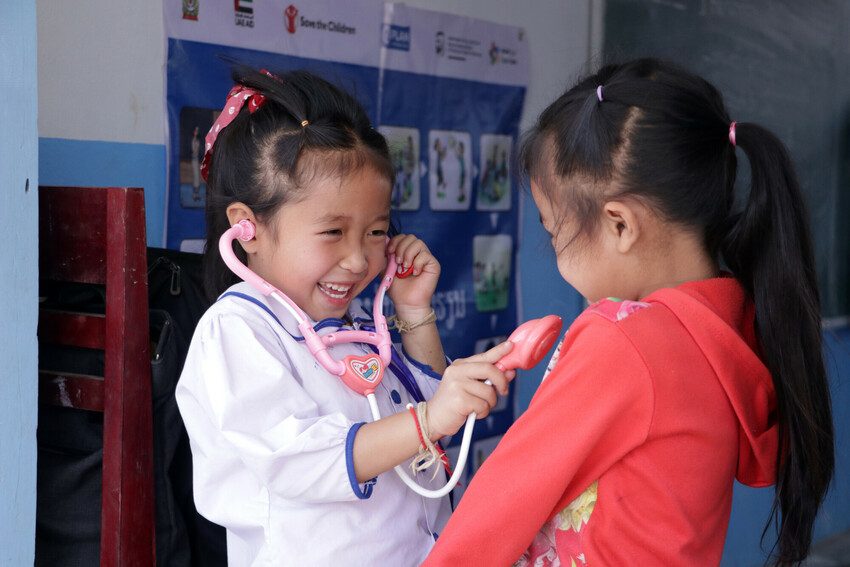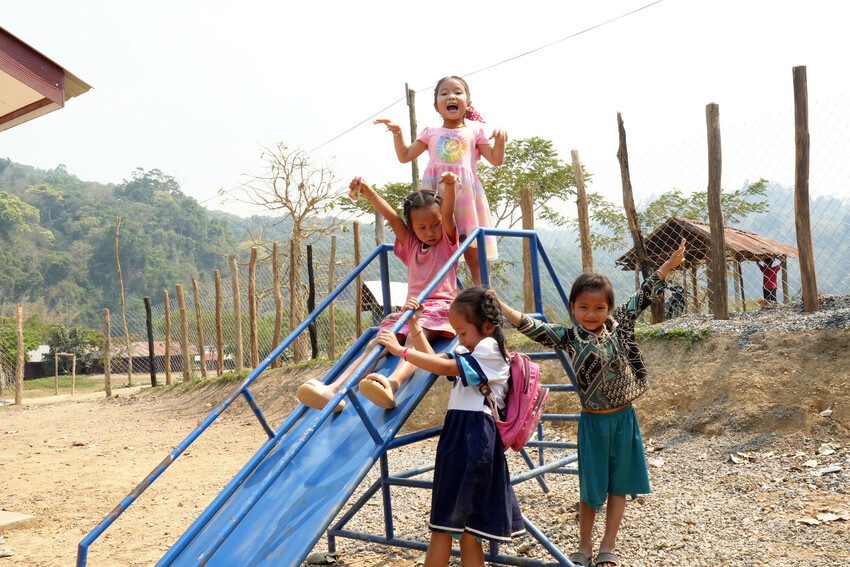Learning through play helps girls’ education and development
14 December 2023Five-year-old Anna wants to be a doctor since she started learning through play at her new pre-school.

“I love playing as a doctor, and my friends are my patients…I want to become a doctor to care for my parents and patients.”
Anna, 5, Laos
Five-year-old Anna is busy playing with her friends. Giggling with joy, she picks up a toy stethoscope and pretends to listen to her friend’s heartbeat. “I love playing as a doctor, and my friends are my patients,” she tells us. “I want to become a doctor to care for my parents and patients.”
From a remote community surrounded by mountains in Laos’ Oudomxay Province, Anna attends one of four new pre-schools. Before the new pre-school was built, the old one was based in a dilapidated wooden classroom, which had previously been used as a storeroom.
Primary school principle, Davone Indavong, explains that the poor facilities were having a negative impact on the children’s education. “Inadequate learning materials and a safe space for children to play meant that many parents did not send their young children to the pre-school, so they faced language and socialising challenges when they entered grade one.”
Two ethnic groups live in the village, the majority of whom are Khmu, which makes up 70% of the village’s population. They speak their own language – Mon-Khmer. However, children are instructed in the official language of Lao from the beginning of primary school, which many children from ethnic communities are unable to speak.
Enjoyable activities support mental and physical development
To ease young ethnic children into education, it is important that activities at the pre-school are enjoyable and support their mental and physical development as well help with their language and socialising skills to prepare them for their primary education journey.
With this in mind, colourful play corners full of exciting educational toys and learning materials have been set up where children can learn to make sense of the world around them. Role playing is especially beneficial for developing language, communication and social skills as the children act out real-life situations and collaborate with each other.
As a child, I could not imagine what I would become when I grew up, but she has already chosen her dream job. I will guide her inspiration rather than criticise her. Whatever she wishes, I will support her.
Hongthong, Anna’s father.
Anna’s father, Hongthong says his daughter has been inspired by the role play sessions that she now plays at home as well as pre-school. “My daughter prefers to take the doctor role. As a child, I could not imagine what I would become when I grew up, but she has already chosen her dream job. I will guide her inspiration rather than criticise her. Whatever she wishes, I will support her.”
As well as constructing the new classroom, Plan International also equipped the pre-school with teaching and learning materials, cabinets and other furniture. Toilets with handwashing stations were also installed and outside, a new playground was built complete with swings and a slide for outdoor play.
Ensuring children’s hygiene is maintained, personal hygiene kits, which included soap, toothpaste, toothbrushes and hand towels were distributed to pupils who also took part in training on how to brush their teeth and wash their hands with soap correctly. Teachers at the school also received training on how to deliver these classes to their young pupils.
“In addition to learning new teaching techniques, I received hygiene practice training which I deliver to my pupils,” shares pre-school teacher Boualoy Soulida. “I feel thankful and happy for the children that Plan International has provided a complete set of assistance for early childhood education for our community.”

Anna took a particular interest in the hygiene lessons. “I need to be healthy before becoming a doctor,” she says. “I have learnt to wash my hands with soap after playing with toys and using the toilet.”
The pre-school is being carefully monitored by the Village Education Development Committee, which aims to ensure that all children between the ages of 4-5 years old are enrolled at the pre-school. If any pre-school age children are not attending, a committee member visits them at home to encourage the parents to send their child to school.
Pheui, a 22-year-old committee member, explains that in the past, there were some cases where the parents didn’t support their children’s schooling. “When we visited them and listened to their concerns, we understood their viewpoint. Poor teaching and learning materials, uninteresting activities and inadequate pre-school facilities had turned children away from the school.”
Safe schools for young children
Now the pre-school is located in a secure section of a big compound that contains both the primary and secondary schools, it is a safe space for young children. The Provincial Project Manager of the Pre-School Education Improvement Project in Houn District, Oudomxay Province, Chanthaboulouth Boualaphanh says that recognise the safety and security of pupils is a must.
“We provided wire netting to the pre-school to make a fence around the building with the support and contribution of villagers. This ensures the young children have fun learning through play and are safe at school. We often saw the primary school pupils come and dominate the swing and slide in the pre-school playground because they did not have any outdoor play equipment at the primary school.”
Four new pre-schools were constructed by Plan International and given to the community in December 2022.


